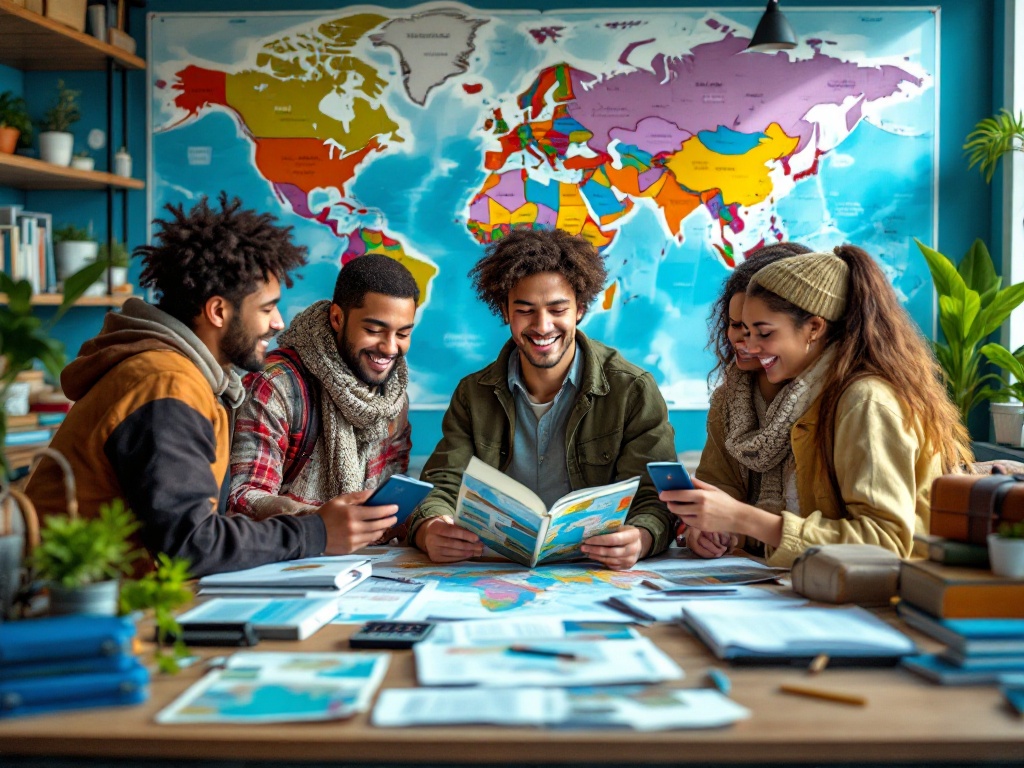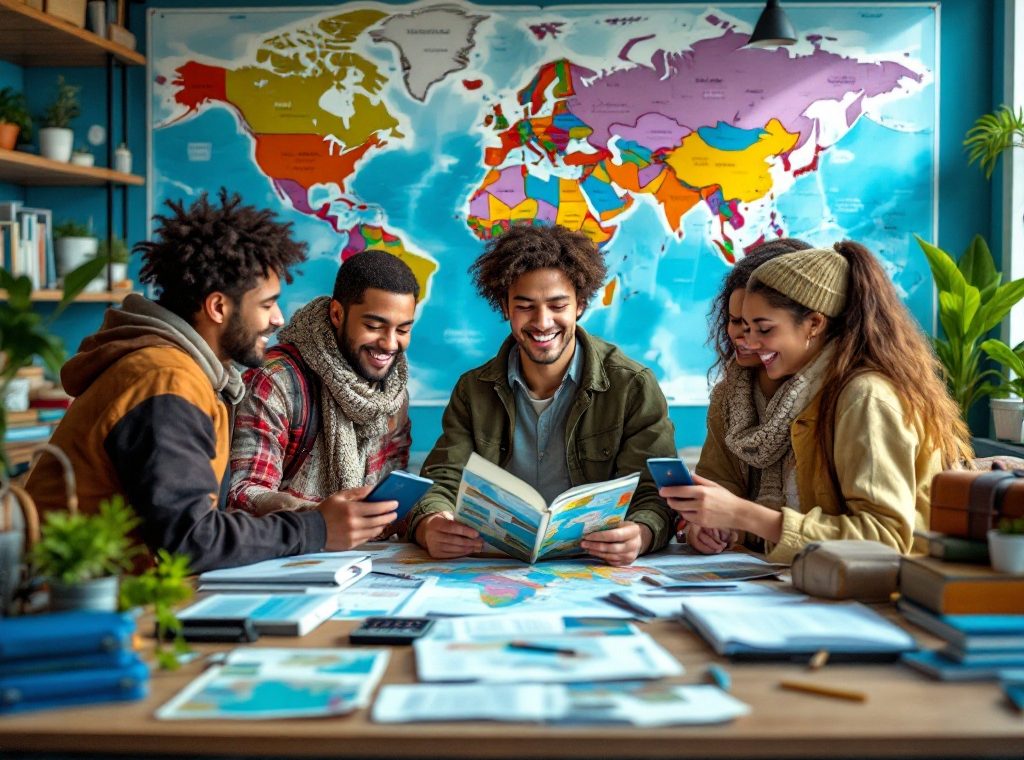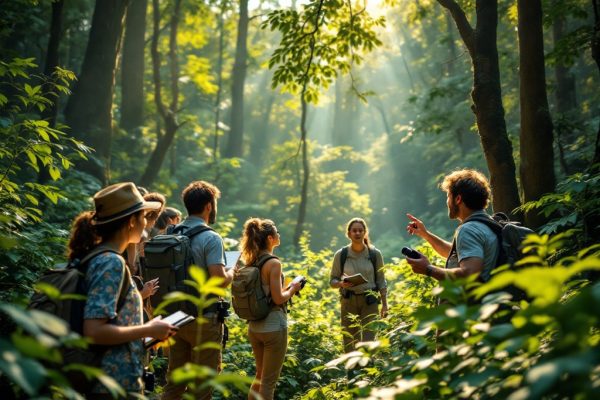Student Travel Programs: How to Prepare
Embarking on a student travel program? Ensure a smooth and enriching journey with our comprehensive guide. From securing essential visas and passports to mastering budget management and packing like a pro, we’ll equip you with the tools for a successful experience. Discover vital health preparation tips, language learning strategies, and how to leverage technology for seamless navigation and communication. Prepare for your adventure and embrace the transformative power of international travel!
Important information

- Essential Documents: Secure a valid passport, visa (if needed), health insurance, enrollment proof, and emergency contacts. Make photocopies of these crucial documents.
- Financial Planning: Create a detailed budget covering all expenses. Explore scholarships and secure a fee-free international debit card or local bank account. Carry emergency cash.
- Travel Logistics: Book flights in advance and consider travel insurance. Research local customs, laws, and healthcare facilities at your destination.
- Health and Safety: Get a health check-up and required vaccinations. Pack necessary medications and a first-aid kit. Understand safety regulations and create an emergency plan.
- Technology and Communication: Download helpful apps for translation, navigation, and communication. Share your itinerary with family and stay connected.
Essential Documentation for Student Travel Programs
Planning to study abroad? Here’s a checklist of essential documents:
Passport: Ensure your passport’s validity extends at least six months beyond your planned return date.
Visa: Check visa requirements for your destination. Your program advisor can provide specific details and a document checklist.
Health Insurance: Carry your health insurance information and any necessary travel authorizations.
Enrollment Proof and Parental Consent (if applicable): Bring proof of enrollment and, if you’re a minor, ensure you have the necessary parental consent forms.
Emergency Contacts: Keep emergency contact information readily accessible.
Photocopies: Photocopy important documents like your insurance policy, emergency contacts, and medical records to avoid issues if the originals are lost or damaged.
What Documents Are Needed?
Ensure you have a valid passport. Having a valid passport is essential for your trip.
Check visa requirements. Depending on your destination, a visa may be required.
Obtain travel and health insurance. Don’t overlook travel and health insurance; pack your medical records and vaccination details too.
Fulfill program-specific requirements. Some programs may have specific requirements, such as proof of enrollment or parental consent forms.
Provide emergency contact information and copy important documents. It’s also wise to provide emergency contact information and make copies of all important documents.
How to Prepare Your Visa and Passport
Begin your visa and passport applications well in advance.
Ensure your passport’s validity extends beyond your program’s duration.
Familiarize yourself with the visa requirements of your destination country.
Financial Planning and Budget Management
Crafting a travel budget is crucial. Consider every expense, from pre-departure visa fees and tuition to accommodation costs. Factor in daily necessities like food and transportation, plus entertainment and a cushion for unforeseen events. Researching your destination’s cost of living is essential.
- Visa fees,
- Tuition,
- Accommodation,
- Food,
- Transportation,
- Entertainment,
- Unforeseen events.
Budgeting apps and spreadsheets can be invaluable tools for tracking expenses. Explore student discounts and funding opportunities like scholarships and grants. Smart money management abroad is vital. A local bank account can be helpful, but a fee-free international debit card is often just as effective. Notify your bank of your travel dates to avoid any card issues.
- Scholarships,
- Grants,
- Student discounts.
Monitor exchange rates and fees. Regularly review your spending to stay within budget.
Safeguard your financial information. Be vigilant against scams.
Carry some emergency cash in a secure spot. This is a wise precaution, especially if your card is lost or stolen.
Careful planning ensures a smoother trip, allowing you to fully embrace the experience without financial worries. Enjoy your travels.
Setting a Budget for Your Trip
Craft a detailed budget encompassing living expenses, travel, and leisure activities.
Research prevailing prices at your destination.
A spreadsheet can be invaluable for monitoring expenditures.
Compare your projected costs against your actual spending.
Explore scholarships and financial aid opportunities.
A contingency fund is highly recommended for unforeseen expenses.
Managing Finances Abroad
Inform your bank about your travel plans to ensure uninterrupted card access. Familiarize yourself with the local currency and understand various payment methods, including credit cards, debit cards, and cash.
Create a comprehensive budget that includes accommodation, meals, transportation, and leisure activities. Explore scholarship opportunities or financial aid programs to potentially reduce program expenses.
While traveling, diligently monitor your spending to stay within budget. Anticipate unforeseen circumstances by establishing an emergency fund.
Plane Tickets and Travel Logistics
To grab the best flight deals, book early, ideally three months in advance. For more affordable options, flexibility with your travel dates and considering nearby airports can significantly impact price. Comparing prices across various websites and airlines is also essential.
Travel insurance is crucial for protection against unforeseen problems like trip cancellations, medical emergencies, or lost luggage. Health insurance is equally vital, especially when traveling internationally. Students should check if their current coverage extends abroad; if not, a separate travel health plan is advisable.
For international trips, ensure your passport is valid and secure any required visas. Research local customs and laws, pack necessary medications, and inform your bank of your travel plans. Photocopying important documents is always a smart precaution.
Tips for Booking Plane Tickets
Snag the best flight deals by booking in advance. This strategy often leads to significant savings.
For even better prices, be flexible with your travel dates. Students can also unlock lower fares by checking for applicable discounts.
Travel Insurance and Health Insurance Necessities
Planning to study abroad? Ensure your peace of mind by securing both travel and health insurance. Travel insurance protects you from unexpected events such as trip cancellations or medical evacuations. Health insurance covers medical costs incurred while abroad, including doctor visits, hospital stays, and prescriptions. Before your departure, confirm your current health plan’s international coverage. If it’s insufficient, consider a supplementary international health insurance plan. Keep both insurance cards and policy details accessible throughout your travels to facilitate claim filing if needed. With these precautions, you can enjoy your international studies with confidence.
Preparing for International Travel
Step 1: Research and Preparation
Start by thoroughly researching your destination, including local laws, customs, safety regulations, and travel advisories from both your home country and your destination. Ensure your passport’s validity extends beyond your trip’s duration and obtain any necessary visas. Consider travel insurance to cover unexpected medical expenses, trip cancellations, or lost luggage.
Step 2: Packing Essentials
Pack appropriate clothing and personal items based on the climate and culture. A basic first-aid kit with any personal medications is essential. Don’t forget to notify your bank and phone company of your travel dates to prevent service interruptions.
Step 3: Finances and Communication
Secure local currency or a travel-friendly card for expenses. Share your itinerary with family or friends, and stay connected during your travels. Familiarize yourself with local emergency contacts and procedures in case of an emergency.
Health Preparation and Medicines
Before your trip, schedule a check-up with your doctor to discuss vaccinations and boosters needed for your destination. Confirm your destination’s health guidelines. Consult your doctor about prescriptions for your trip. Carry a copy of your prescription and a doctor’s note explaining your medical needs. Research local healthcare facilities at your destination. Inform your program leaders and on-site staff about any health concerns.
Importance of Health Checkups and Vaccinations
Before traveling, ensure you’re fit with a checkup and protect yourself from diseases with necessary vaccinations. Stay healthy abroad.
Managing Medications and Health Disclosure
Before embarking on your journey, gather essential medications, especially those challenging to find at your destination. Discuss necessary vaccinations and pertinent health precautions with your doctor. Keep copies of your medical records and note down any allergies or pre-existing health conditions. Sharing this information with your program provider guarantees adequate support. A compact first-aid kit with bandages, pain relievers, antiseptic wipes, and personal medical items is also advisable.
Packing Tips and Essentials
Clothing and Footwear
Pack light clothing appropriate for the predicted weather. Comfortable walking shoes are essential for exploring.
Essentials and Health
Remember essential toiletries, medications, and a first-aid kit. A reusable water bottle is crucial for staying hydrated.
Electronics and Documents
A power adapter and portable charger will keep your devices powered. Your passport and visa are absolutely vital.
Other essentials
Bring any necessary program materials. A small backpack is perfect for day trips.
Efficient Packing Tips
Roll your clothes to minimize wrinkles and maximize space. Packing cubes are excellent for organization and compression. Place heavier items at the bottom of your bag and utilize every bit of space, even inside your shoes.
What to Pack: Walking Shoes and Toiletries
Pack comfortable, durable walking shoes suitable for various terrains. Remember essential toiletries:
- toothbrush,
- toothpaste,
- shampoo,
- deodorant.
Travel-sized versions are space-savers. Consider purchasing these items locally to lighten your load.
Efficient Packing Strategies
Save space and prevent wrinkles by rolling your clothes instead of folding them.
Packing cubes are another excellent way to organize and compress your belongings.
Shoes can be bulky, so limit yourself to two pairs: one versatile option and a comfortable pair for walking.
Language Skills and Cultural Awareness
Learning a new language dramatically enhances travel experiences. Even simple phrases facilitate communication and demonstrate respect for the local culture. Pre-trip research on customs smooths social interactions, while understanding traditions fosters appreciation for local lifestyles and sparks meaningful conversations with residents. Cultural awareness cultivates adaptability, empathy, and new perspectives, ultimately deepening your global understanding. This also makes connecting with people from diverse backgrounds easier. A simple greeting, for instance, can have a significant impact. Ultimately, language acquisition transcends mere vocabulary; it unlocks a different way of life.
Language Learning and Basic Phrases
Learning a few local phrases can greatly enhance your travels. Simple greetings like “hello” and “goodbye” can make a significant difference, while polite words such as “please” and “thank you” are always appreciated. Knowing how to ask for directions (“where is…?”) or inquire about prices (“how much does this cost?”) is incredibly useful. This allows you to confidently navigate, order food, and handle transactions. Beyond the practical benefits, learning basic phrases shows respect for the local culture, fostering positive interactions and enriching your travel experience.
Researching Local Culture and Etiquette
Immersing yourself in local customs is crucial for students, encompassing everything from greetings and meals to attire. Respecting these traditions, particularly by learning basic phrases, not only demonstrates courtesy but also facilitates communication. Openness to new experiences fosters cultural sensitivity and helps you connect with locals. For instance, familiarizing yourself with dining etiquette and appropriate dress can significantly enrich your travels. Adaptability is key, but always prioritize respect for local customs. Here’s how you can engage with local customs:
Learn basic phrases. Starting with simple greetings like “hello” and “thank you” can go a long way in showing respect and building rapport.
Understand mealtime etiquette. Researching local customs around dining, such as using utensils or sharing dishes, can prevent unintentional faux pas.
Dress respectfully. Being mindful of local dress codes, especially when visiting religious sites or formal events, demonstrates cultural sensitivity.
Be open to new experiences. Embrace opportunities to try local cuisine, participate in traditional activities, and learn about local customs firsthand.
Utilizing Technology for a Smooth Experience
Staying connected abroad is easier than ever. For overcoming language barriers, translation apps like Google Translate, iTranslate, or SayHi can be invaluable tools for effective communication. When exploring new cities, navigation apps such as Google Maps, Citymapper, or Maps.me provide easy-to-follow directions and help you locate important places with confidence. Staying in touch with loved ones back home is also essential. Apps like WhatsApp, Skype, or Zoom bridge the distance, offering valuable emotional support and a sense of connection while you’re away.
Downloading Useful Apps
Navigation Apps
- google maps,
- citymapper,
- maps.me.
Translation and Communication Apps
- google translate,
- duolingo,
- whatsapp,
- skype,
- zoom.
Download offline maps and currency converters before your trip for convenient access to essential information.
Maintaining Communication with Loved Ones
Staying connected with loved ones while traveling is easy with apps like WhatsApp, Messenger, Skype, and FaceTime. These platforms offer simple messaging and calling features, allowing you to keep in touch wherever you go.
Building a Travel Mindset
Be Prepared and Adaptable
travel is unpredictable, so adaptability and resilience are essential. researching potential issues at your destination and brainstorming solutions beforehand will enhance your preparedness. resilience helps you recover from setbacks and manage travel stress effectively.
- research potential travel disruptions.
- brainstorm solutions for common issues.
- develop coping mechanisms for travel stress.
Prioritize Safety
understand the rules and emergency plans at your destination. familiarize yourself with local laws and regulations, and identify important contacts. having a plan for common travel problems will minimize stress.
- learn local laws and regulations.
- identify emergency contacts (local services, embassy).
- create a plan for lost luggage or medical emergencies.
Developing Adaptability and Resilience
A successful trip hinges on adaptability. Unexpected hiccups are inevitable, so flexibility and a positive outlook are essential. Resilience is also key, empowering students to overcome setbacks and effectively handle challenges. These skills enrich the learning experience and make the trip more rewarding. Flexibility allows students to adjust to unforeseen circumstances, while a positive attitude helps maintain morale during difficulties. Resilience enables students to bounce back from setbacks, fostering problem-solving skills and adaptability. These combined traits create a more enriching and rewarding travel experience.
Understanding Safety Regulations and Emergency Plans
Research your destination’s rules and regulations before traveling to prioritize your safety.
Develop a comprehensive emergency plan, including contact information for local authorities, your program provider, and your embassy.
Establish a reliable communication system with family and friends, sharing your itinerary and providing them with emergency contacts.
Familiarize yourself with local emergency numbers and procedures.
Identify safe havens like police stations and hospitals at your destination.














